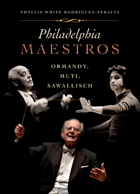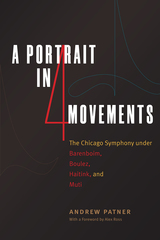2 books about Muti, Riccardo

Philadelphia Maestros
Ormandy, Muti, Sawallisch
Phyllis Rodriquez-Peralta
Temple University Press, 2006
Over the past century, the Philadelphia Orchestra has earned its reputation as one of the finest orchestras in the world. Philadelphia Maestros tells the tale of this marvelous orchestra through the tenures of three conductors: Eugene Ormandy, Riccardo Muti, and Wolfgang Sawallisch. With their singular approaches to sound and public image, all three maestros left an indelible mark on the Orchestra, and the cultural life of the city of Philadelphia. A lifelong fan and scholar of the Philadelphia Orchestra, Phyllis White Rodríguez-Peralta paints intimate portraits of the conductors using archival material and interviews with musicians, including pianists Gary Graffman and Lang Lang, and violinist Sarah Chang. Rodríguez-Peralta's text captivates as she recounts Eugene Ormandy's performance as a last-minute substitute for guest conductor Arturo Toscanini; Riccardo Muti's magnetic presence and international fame; and the role of Wolfgang Sawallisch in moving the Orchestra to its grand new hall at the Kimmel Center. Engaging and entertaining, Philadelphia Maestros will be a welcome addition to any aficionado's bookshelf.
[more]

A Portrait in Four Movements
The Chicago Symphony under Barenboim, Boulez, Haitink, and Muti
Andrew Patner
University of Chicago Press, 2019
“Playing in an orchestra in an intelligent way is the best school for democracy.”—Daniel Barenboim
The Chicago Symphony Orchestra has been led by a storied group of conductors. And from 1994 to 2015, through the best work of Daniel Barenboim, Pierre Boulez, Bernard Haitink, and Riccardo Muti, Andrew Patner was right there. As a classical music critic for the Chicago Sun-Times and WFMT radio, Patner was able to trace the arc of the CSO’s changing repertories, all while cultivating a deep rapport with its four principal conductors.
This book assembles Patner’s reviews of the concerts given by the CSO during this time, as well as transcripts of his remarkable radio interviews with these colossal figures. These pages hold tidbits for the curious, such as Patner’s “driving survey” that playfully ranks the Maestri he knew on a scale of “total comfort” to “fright level five,” and the observation that Muti appears to be a southpaw on the baseball field. Moving easily between registers, they also open revealing windows onto the sometimes difficult pasts that brought these conductors to music in the first place, including Boulez’s and Haitink’s heartbreaking experiences of Nazi occupation in their native countries as children. Throughout, these reviews and interviews are threaded together with insights about the power of music and the techniques behind it—from the conductors’ varied approaches to research, preparing scores, and interacting with other musicians, to how the sound and personality of the orchestra evolved over time, to the ways that we can all learn to listen better and hear more in the music we love. Featuring a foreword by fellow critic Alex Ross on the ethos and humor that informed Patner’s writing, as well as an introduction and extensive historical commentary by musicologist Douglas W. Shadle, this book offers a rich portrait of the musical life of Chicago through the eyes and ears of one of its most beloved critics.
The Chicago Symphony Orchestra has been led by a storied group of conductors. And from 1994 to 2015, through the best work of Daniel Barenboim, Pierre Boulez, Bernard Haitink, and Riccardo Muti, Andrew Patner was right there. As a classical music critic for the Chicago Sun-Times and WFMT radio, Patner was able to trace the arc of the CSO’s changing repertories, all while cultivating a deep rapport with its four principal conductors.
This book assembles Patner’s reviews of the concerts given by the CSO during this time, as well as transcripts of his remarkable radio interviews with these colossal figures. These pages hold tidbits for the curious, such as Patner’s “driving survey” that playfully ranks the Maestri he knew on a scale of “total comfort” to “fright level five,” and the observation that Muti appears to be a southpaw on the baseball field. Moving easily between registers, they also open revealing windows onto the sometimes difficult pasts that brought these conductors to music in the first place, including Boulez’s and Haitink’s heartbreaking experiences of Nazi occupation in their native countries as children. Throughout, these reviews and interviews are threaded together with insights about the power of music and the techniques behind it—from the conductors’ varied approaches to research, preparing scores, and interacting with other musicians, to how the sound and personality of the orchestra evolved over time, to the ways that we can all learn to listen better and hear more in the music we love. Featuring a foreword by fellow critic Alex Ross on the ethos and humor that informed Patner’s writing, as well as an introduction and extensive historical commentary by musicologist Douglas W. Shadle, this book offers a rich portrait of the musical life of Chicago through the eyes and ears of one of its most beloved critics.
[more]
READERS
Browse our collection.
PUBLISHERS
See BiblioVault's publisher services.
STUDENT SERVICES
Files for college accessibility offices.
UChicago Accessibility Resources
home | accessibility | search | about | contact us
BiblioVault ® 2001 - 2024
The University of Chicago Press









